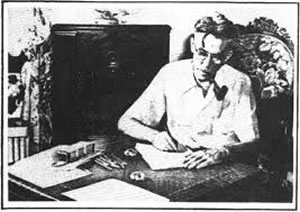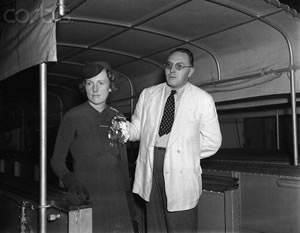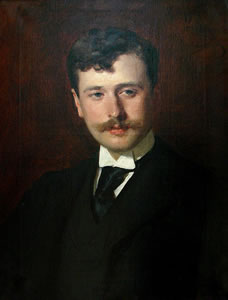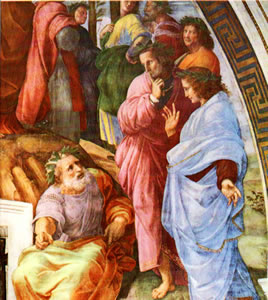De Amerikaanse schrijver James Thurber werd geboren op 8 december 1894 in Columbus, Ohio. Zie ook mijn blog van 8 december 2006 en ook mijn blog van 8 december 2008 en ook mijn blog van 8 december 2009.
Uit: The Last Clock
„In a country the other side of tomorrow, an ogre who had eaten a clock and had fallen into the habit of eating clocks was eating a clock in the clockroom of his castle when his ogress and their ilk knocked down the locked door and shook their hairy heads at him.
“Wulsa malla?” gurgled the ogre, for too much clock oil had turned all his “t”s to “l”s.
“Just look at this room!” exclaimed the ogress, and they all looked at the room, the ogre with eyes as fogged as the headlights of an ancient limousine. The stone floor of the room was littered with fragments of dials, oily coils and springs, broken clock hands, and pieces of pendulums. “I’ve brought a doctor to look at you,” the ogress said.
The doctor wore a black beard, carried a black bag, and gave the ogre a black look. “This case is clearly not in my area,” he said.
The ogre struck three, and the doctor flushed.
“This is a case for a clockman,” the doctor said, “for the problem is not what clocks have done to the ogre but what the ogre has done to clocks.”
“Wulsa malla?” the ogre gurgled again.
“Eating clocks has turned all his ‘t’s to ‘l’s,” the ogress said. “That what clocks have done to him.”
“Then your clockman may have to call in consultation a semanticist or a dictionist or an etymologist or a syntaxman,” the non-clock doctor said, and he bowed stiffly and left the room.
The next morning, the ogress brought into the clockroom a beardless man with a box of tools under his arm. “I’ve brought a clockman to see you,” she told the ogre.
“No, no, no,” said the beardless man with a box of tools under his arm. “I’m not a clockman. I thought you said clogman. I’m a clogman. I cannot ethically depart from my area, which is clogged drains and gutters. I get mice out of pipes, and bugs out of tubes, and moles out of tiles, and there my area ends.” The clogman bowed and went away.“

James Thurber (8 december 1894 – 2 november 1961)
De Amerikaanse dichter en schrijver William Hervey Allen werd geboren op 8 december 1889 in Pittsburgh. Zie ook mijn blog van 8 december 2008 en ook mijn blog van 8 december 2009.
Uit: Action at Aquila
„Southward, two mighty ranges of the Appalachians shouldered their way into the blue distance like tremendous caravans marching across eternity. Between those parallel ridges the Valley of the
Shenandoah lay, apparently, as serene and beautiful as the interior of the Isle of Aves.
From a high shoulder of the Blue Ridge, where Colonel Nathaniel Franklin of the 6th Pennsylvania Cavalry had stopped for a moment to breathe his horse, he could see almost into North Carolina.
“Rebel country,” for the Confederates still held the upper part of the Valley and the horizons beyond.
Not that the colonel thought of it as rebel country, exactly. The sight of that magnificent landscape–despite its great beauty, perhaps because of it–brought to his eyes a mist of sorrow that threatened momentarily to overcast the countryside which rolled away southward before him. He brushed that mist indignantly away– and swore softly. He regarded all the country he was looking at as
still a part of the United States, some of the inhabitants of which needed to be reconverted to the faith of their fathers—by apostolic blows and knocks if necessary. But there was nothing personal about the process to the colonel. The problem posed by the horizons rolling before him was, he liked to think, purely a military one. And in the old days he had had too many true friends on the yon side of the Potomac to lump them all under the one indignant epithet of “rebels,” even now, after several years of desperate fighting.
There were not many Americans left, however, who still felt as the colonel did. He was naturally possessed of that state of being which in the eighteenth century would have been described as an
amiable soul. There was nothing weak about his amiability, but it did make hate and blind bitterness about anything hard to bear.
Now, in the early autumn of 1864, he sat looking down into the peaceful, because devastated, theatre of civil war with a dull ache about his heart.“

Hervey Allen (8 december 1889 – 28 december 1949)
Hier met zijn vrouw tijdens een scheepsreis
De Franse theaterauteur Georges Feydeau werd geboren op 8 december 1862 in Parijs. Zie ook mijn blog van 8 december 2006 en ook mijn blog van 8 december 2008 en ook mijn blog van 8 december 2009.
Uit : Le dindon
Acte I
„LUCIENNE. – Ah ! quelle fatuité !
PONTAGNAC. – Ce n’est pas de la fatuité, c’est de l’observation. LUCIENNE. – Mais enfin, monsieur, je ne vous connais pas. PONTAGNAC. – Mais moi non plus, madame, et je le regrette tellement que je veux faire cesser cet état de choses… Ah ! Madame…
LUCIENNE. – Monsieur ! PONTAGNAC. – Ah ! Marguerite ! 8
LUCIENNE,s’oubliant. – Lucienne, d’abord ! PONTAGNAC. – Merci ! Ah ! Lucienne ! LUCIENNE. – Hein ! Mais, monsieur, je vous défends !… Qui vous a permis ?… PONTAGNAC. – Ne venez-vous pas de me dire comment je devais vous appeler ! LUCIENNE. – Enfin, monsieur, pour qui me prenez- vous ? Je suis une honnête femme ! PONTAGNAC. – Ah ! tant mieux ! J’adore les honnêtes femmes !… LUCIENNE. – Prenez garde, monsieur ! Je voulais éviter un esclandre, mais puisque vous ne voulez pas partir, je vais appeler mon mari.
PONTAGNAC. – Tiens ! vous avez un mari ?
LUCIENNE. – Parfaitement, monsieur !
PONTAGNAC. – C’est bien ! Laissons cet imbécile de côté !
LUCIENNE. – Imbécile ! mon mari !
PONTAGNAC. – Les maris des femmes qui nous plaisent sont toujours des imbéciles. LUCIENNE,remontant. – Eh bien ! vous allez voir comment cet imbécile va vous traiter ! Vous ne voulez pas sortir ?…“
PONTAGNAC. – Moins que jamais ! LUCIENNE, appelant à droite. – C’est très bien !… Crépin !…
PONTAGNAC. – Oh ! vilain nom !…
LUCIENNE. – Crépin !…
Scène II Les mêmes, Vatelin. VATELIN. – Tu m’appelles ? ma chère amie…
PONTAGNAC, à part. – Vatelin ! fichtre !
VATELIN, reconnaissant Pontagnac. – Ah ! tiens !
Pontagnac ! ce cher ami !
LUCIENNE. – Hein !
PONTAGNAC. – Ce bon Vatelin !
VATELIN. – Ça va bien ?
PONTAGNAC. – Mais très bien !
LUCIENNE, à part. – Il le connaît.“

Georges Feydeau (8 december 1862 – 5 juni 1921)
Portret door Emile Carolus-Duran
De Romeinse dichter en schrijver Quintus Horatius Flaccus werd geboren op 8 december 65 v. Chr. Zie ook mijn blog van 8 december 2006 en ook mijn blog van 8 december 2008 en ook mijn blog van 8 december 2009.
Ode II.3
Bewaar in tegenspoed uw evenwicht
en blijf gespeend aan uitgelatenheid,
wanneer het goed gaat! Sterven, Dellius,
dat doen wij allemaal, wie zich verkniest,
en wie een feest maakt van den langen dag,
in ’t gras verscholen met een fijne flesch.
Hoe lokt de schaduw, waar het berkenloof
de hooge stammen van de dennen kust,
het beekje kabb’lend langs de helling vliet!
Laat hier den wijn, laat hier het reukwerk brengen,
den korten bloei der wondermooie roos,
zoolang uw beurs, uw jeugd, uw ster gedoogt!
Uw grondbezit, uw huis, uw buitenplaats
moet gij eens afstaan; en uw erfgenaam
graait in de schatten, die gij hebt vergaard.
Het geeft niet, of gij rijk zijt en van adel
of arm als Job en zonder voorgeslacht;
want onmeedoogend eischt de dood u op.
Een einde wacht ons allen. Vroeg of laat
treft ons het lot, dat in de ranke boot
ons inscheept naar het eeuwig ballingsoord.
Vertaald door Dr. A. Rutgers van der Loeff

Horatius (8 december 65 v. Chr. – 27 november 8 v. Chr.)
Dichters in gesprek met Horatius,
Fresco van Rafaël Santi in het Apostolisch Paleis, Vaticaanstad.
